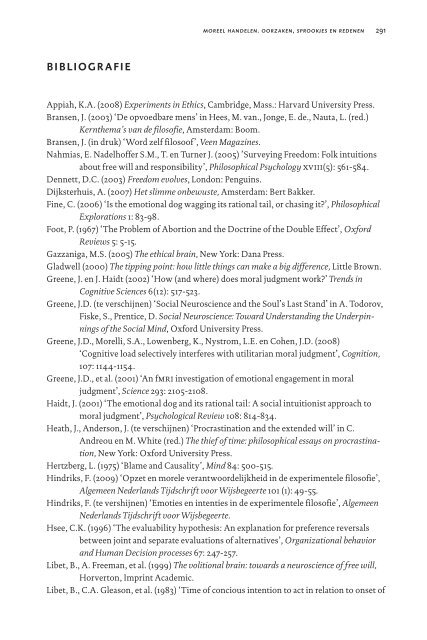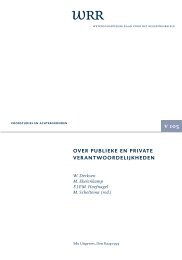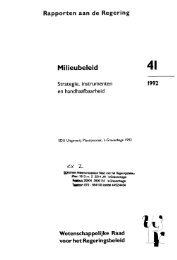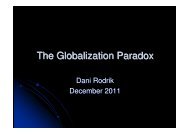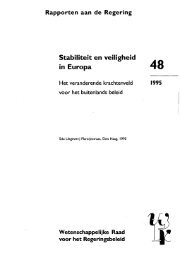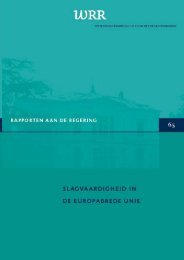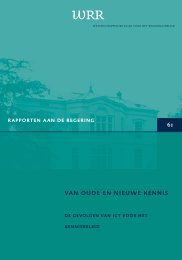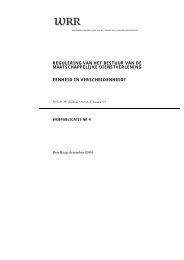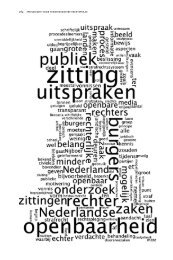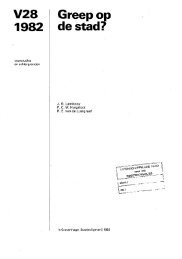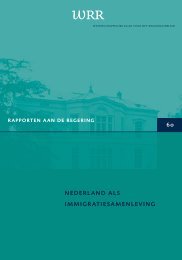De menselijke beslisser - Wetenschappelijke Raad voor het ...
De menselijke beslisser - Wetenschappelijke Raad voor het ...
De menselijke beslisser - Wetenschappelijke Raad voor het ...
Create successful ePaper yourself
Turn your PDF publications into a flip-book with our unique Google optimized e-Paper software.
ibliografie<br />
moreel handelen. oorzaken, sprookjes en redenen<br />
Appiah, K.A. (2008) Experiments in Ethics, Cambridge, Mass.: Harvard University Press.<br />
Bransen, J. (2003) ‘<strong>De</strong> opvoedbare mens’ in Hees, M. van., Jonge, E. de., Nauta, L. (red.)<br />
Kernthema’s van de filosofie, Amsterdam: Boom.<br />
Bransen, J. (in druk) ‘Word zelf filosoof’, Veen Magazines.<br />
Nahmias, E. Nadelhoffer S.M., T. en Turner J. (2005) ’Surveying Freedom: Folk intuitions<br />
about free will and responsibility’, Philosophical Psychology xviii(5): 561-584.<br />
<strong>De</strong>nnett, D.C. (2003) Freedom evolves, London: Penguins.<br />
Dijksterhuis, A. (2007) Het slimme onbewuste, Amsterdam: Bert Bakker.<br />
Fine, C. (2006) ‘Is the emotional dog wagging its rational tail, or chasing it?’, Philosophical<br />
Explorations 1: 83-98.<br />
Foot, P. (1967) ‘The Problem of Abortion and the Doctrine of the Double Effect’, Oxford<br />
Reviews 5: 5-15.<br />
Gazzaniga, M.S. (2005) The ethical brain, New York: Dana Press.<br />
Gladwell (2000) The tipping point: how little things can make a big difference, Little Brown.<br />
Greene, J. en J. Haidt (2002) ‘How (and where) does moral judgment work?’ Trends in<br />
Cognitive Sciences 6(12): 517-523.<br />
Greene, J.D. (te verschijnen) ‘Social Neuroscience and the Soul’s Last Stand’ in A. Todorov,<br />
Fiske, S., Prentice, D. Social Neuroscience: Toward Understanding the Underpinnings<br />
of the Social Mind, Oxford University Press.<br />
Greene, J.D., Morelli, S.A., Lowenberg, K., Nystrom, L.E. en Cohen, J.D. (2008)<br />
‘Cognitive load selectively interferes with utilitarian moral judgment’, Cognition,<br />
107: 1144-1154.<br />
Greene, J.D., et al. (2001) ‘An fmri investigation of emotional engagement in moral<br />
judgment’, Science 293: 2105-2108.<br />
Haidt, J. (2001) ‘The emotional dog and its rational tail: A social intuitionist approach to<br />
moral judgment’, Psychological Review 108: 814-834.<br />
Heath, J., Anderson, J. (te verschijnen) ‘Procrastination and the extended will’ in C.<br />
Andreou en M. White (red.) The thief of time: philosophical essays on procrastination,<br />
New York: Oxford University Press.<br />
Hertzberg, L. (1975) ‘Blame and Causality’, Mind 84: 500-515.<br />
Hindriks, F. (2009) ‘Opzet en morele verantwoordelijkheid in de experimentele filosofie’,<br />
Algemeen Nederlands Tijdschrift <strong>voor</strong> Wijsbegeerte 101 (1): 49-55.<br />
Hindriks, F. (te vershijnen) ‘Emoties en intenties in de experimentele filosofie’, Algemeen<br />
Nederlands Tijdschrift <strong>voor</strong> Wijsbegeerte.<br />
Hsee, C.K. (1996) ‘The evaluability hypothesis: An explanation for preference reversals<br />
between joint and separate evaluations of alternatives’, Organizational behavior<br />
and Human <strong>De</strong>cision processes 67: 247-257.<br />
Libet, B., A. Freeman, et al. (1999) The volitional brain: towards a neuroscience of free will,<br />
Horverton, Imprint Academic.<br />
Libet, B., C.A. Gleason, et al. (1983) ‘Time of concious intention to act in relation to onset of<br />
291


